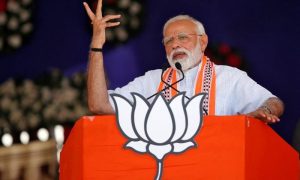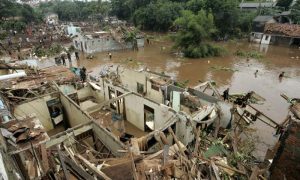The presence of terrorist groups in Afghanistan is a clear and present danger to regional peace. Strong concerns expressed frequently from Pakistan side are now getting endorsements from international watchdogs and neighboring countries that share borders with Afghanistan. A number of UN Security Council reports have pointed out the establishment of terrorist camps inside Afghanistan by Al-Qaeda, ISKP, and TTP. A recent report of the UNSC clearly specified the establishment of four terrorist camps in Ghazni, Laghman, Parwan, and Uruzgan provinces along with a new weapon depot in Panjshir province. Unfortunately, the interim Afghan government under the control of the Taliban could not yet effectively respond to such accusatory reports.
Denial on the part of Afghan Taliban is neither beneficial for terror-infected Afghanistan nor serves any purpose for the affected neighbors. The lukewarm response of the Taliban regime, on genuine cross-border terrorism-specific concerns of Pakistan, is a strong reflection of their unparalleled soft corner for banned TTP. The active presence of banned terrorist outfits like TTP on Afghan soil with full impunity is significantly contributing to its alarming capacity to execute hardcore terrorist attacks inside Pakistan. The surging terrorism wave in KP and Balochistan around the elections was aimed at disrupting the normal functioning of the state. It is more than obvious that banned TTP, its splinter groups, and all ideological allies are striving hard to destabilize Pakistan.
Patterns of terrorist attacks on law enforcement agencies, military and para-military troops have indicated sharp similarity of objectives between religiously motivated extremist-banned terrorist outfits and ethnically charged separatist terrorist groups. Frequent attacks on police and military personnel indicate that all banned terrorist groups have been tasked to rupture the writ of state in Balochistan and Khyber Pakhtunkhwa. Security chaos triggered by the terrorism wave means a direct attack on the stabilizing efforts of Pakistan to overcome the complicated economic challenges. Two attacks on strategic targets inside Balochistan followed by the precisely planned killing of Chinese citizens in Basham further substantiate the larger anti-state designs of the terrorist groups. While playing in the hands of anti-Pakistan forces, banned TTP continues to bluff its brain-washed foot soldiers with misinterpreted religious concepts.
On one hand, self-style commanders of banned TTP are motivating the recruited members to participate in hardcore terrorist attacks against the motherland to pave the way for an undefined religious revolution. On the other hand, top-tier banned TTP commanders including the masterminds of terrorist attacks are enjoying luxurious lives in safe havens funded by their foreign masters. Turf war within the ranks of banned terrorist outfits is evident with various killings of TTP commanders which took place right inside the safe havens. Contrary to the false Jihadi claims, the opportunist top-tier leadership of TTP is thickly involved in fighting each other for more financial gains and unchallenged control on terror machinery. The unholy agenda of TTP, camouflaged with the mask of religious sacredness, is largely exposed.
Killings of numerous terrorist commanders inside Afghanistan have actually exposed their lust for power and money in the garb of Jihad. Killings of much talked about commanders like Umer Khalid Khorasani, Mufti Hasan Sawati, Umer Mansoor, and Fazlullah were attributed to unknown assailants primarily to shroud the exposure of turf war and beneath the surface abhorrent crimes of the banned TTP. Hiding inside Afghanistan and escaping the rigors of self-style violent struggle is self-speaking proof of duality on part of banned TTP leaders. After losing ground in Pakistan amid effective military operations, banned TTP leaders had to seek shelter under the umbrella of Tehreek e Taliban Afghanistan (TTA). A time came when Afghan mentors of TTP floated the idea of dialogue with Pakistan. This proposal was nothing but a cunning move to fetch sufficient regrouping time for the banned TTP. The recent surge in terrorism and reappearance of TTP-backed splinter groups is not possible without the support of foreign elements. Despite damaging Pakistan with numerous attacks, TTP is not capable enough to stand against the national resolve. The web of terrorism woven jointly by the banned TTP and its well-wishers in TTA is neither good for regional peace nor affordable for the ruling regime of Afghanistan.
Movers and shakers of anti-Pakistan terrorism should keep in focus the hard consequences revealed like divine writing on the wall. One, foot soldiers fielded against the state of Pakistan carry no weightage to their handlers who themselves are deeply entangled in dubious games of personal interests. Two, patrons and sympathizers of TTP hidden in the files of TTA are badly hurting the bilateral ties with Pakistan and also spoiling the already tainted profile of the ruling regime which at the moment has zero recognition internationally.
Three, targeting the strategic projects of Pakistan linked with China indicates alignment between the religious extremist and ethnic separatist terrorist outfits. Obviously, this cohesion of objectives is not possible without common handlers. A realistic introspection within TTA is the only viable option to break the intriguing web of terrorism. Deviation from this sane course would prove more disastrous than the present catastrophe for Afghanistan.

























